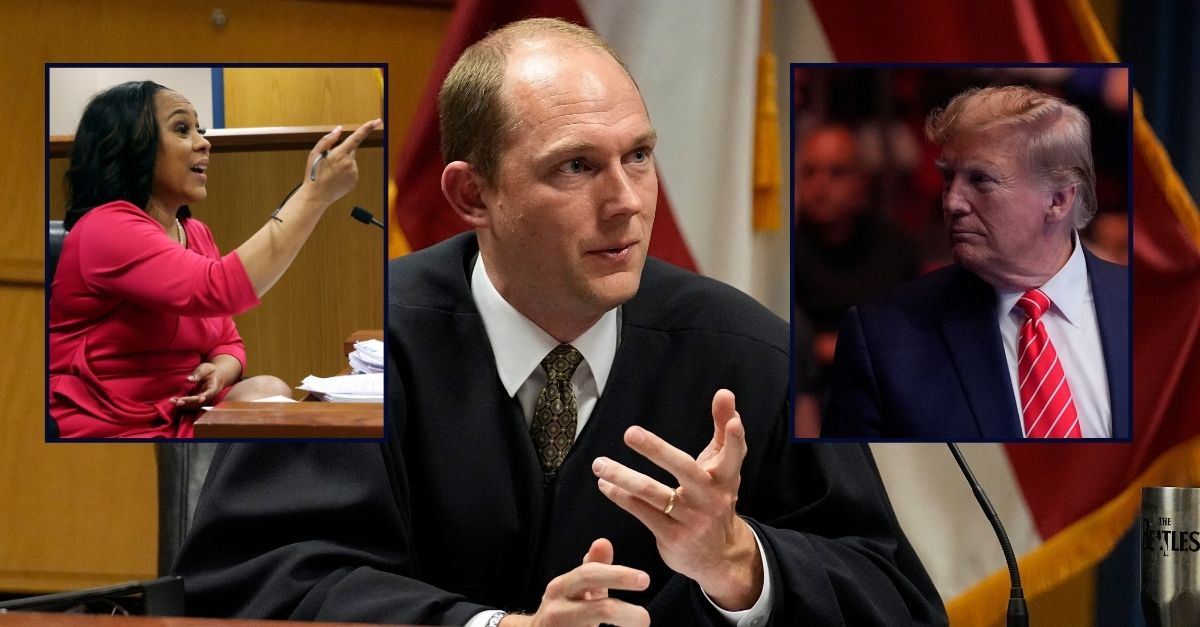
Main image: Fulton County Superior Judge Scott McAfee speaks in court, Tuesday, Feb. 27, 2024, in Atlanta. (AP Photo/Brynn Anderson, Pool); Inset left: Fulton County District Attorney Fani Willis testifies during a hearing on the Georgia election interference case, Feb. 15, 2024, in Atlanta; (Alyssa Pointer/Pool Photo via AP); Inset right: Former President Donald Trump waits for the start of a UFC 299 mixed martial arts bout, early Sunday, March 10, 2024, in Miami. (AP Photo/Wilfredo Lee)
Former President Donald Trump on Monday asked the judge overseeing his racketeering (RICO) and election subversion case in Georgia to allow an immediate appeal of the decision that kept Fulton Country District Attorney Fani Willis in charge of the prosecution.
The nine-page filing by Trump and seven co-defendants asks Fulton County Superior Court Judge Scott McAfee to issue a certificate of immediate review so attorneys can plead their clients’ disqualification and dismissal case before the Georgia Court of Appeals.
“Whether District Attorney Willis and her Office are permitted to continue representing the State of Georgia in prosecuting the Defendants in this action is of the utmost importance to this case, and ensuring the appellate courts have the opportunity to weigh in on these matters pre-trial is paramount,” the motion reads.
Last week, McAfee partially granted the defense motion to disqualify Willis. The court’s order was based on a finding that the onetime romantic relationship between Willis and now-former lead prosecutor Nathan Wade created “a significant appearance of impropriety that infects the current structure of the prosecution team.”
The defense, however, still wanted the case dismissed in its entirety, according to the Monday filing. But Trump and his co-defendants would settle for Willis and her office being barred from any further involvement in the complex and high-profile case, the motion explains.
Attorneys for the defendants largely rely on “factual findings” committed to the record by McAfee himself. As Law&Crime previously reported, those findings suggest McAfee had been frequently frustrated with some of the state’s behavior so far — but felt that his hands were tied by precedent, or the lack thereof.
“In its Order, the Court found that District Attorney Willis’ actions had created an appearance of impropriety and an ‘odor of mendacity’ that lingers in this case,” the Monday defense motion notes.
The motion also cites a section of McAfee’s order where the judge opined that “an outsider could reasonably think that District Attorney Willis is not exercising her independent professional judgment totally free of any compromising influences.”
While McAfee ruled Wade’s exit from the case would cure the issues at the trial court level, the defense argues that “the relevant case law” in Georgia says something more fundamental must be done.
“Given these facts and the current state of the case law, the Court of Appeals should speak definitively to this outcome-determinative issue now,” the motion reads.
The crux of the defense’s argument for removing Willis and Wade is that the district attorney hired her then-boyfriend for the job, overpaid him, and then reaped something akin to a financial windfall in the form of vacations, travel, lodging, and other such gifts. Those alleged gifts, the defense argued, were paid for with public funds.
In the end, McAfee said the defense had not met its burden to show Willis obtained “a material financial benefit as a result of her decision to hire” Wade — or that the “financial gain flowing from her relationship” motivated Willis to prosecute and prolong the case.
Trump and the other defendants in the case also leveled “forensic misconduct” allegations against Willis over her Martin Luther King Jr. Day speech at Big Bethel A.M.E. Church in Atlanta.
The defense accused the district attorney of using the nationally-televised speech to make “inflammatory extrajudicial racial comments” about the defendants and of improperly stoking “racial animus” to influence would-be jurors in retaliation for, and in order to deflect from, the allegations raised in the motion to disqualify.
McAfee was withering in his estimation of this speech.
“The effect of this speech was to cast racial aspersions at an indicted Defendant’s decision to file this pretrial motion,” the judge wrote.
McAfee also strongly suggested that Willis’ church speech would likely form the basis for the state to be sanctioned in the future.
The defendants took stock of that issue on Monday as well.
“The Court also found that District Attorney Willis’ nationally televised speech at Big Bethel AME Church on January 14, 2024 was ‘legally improper,’ but declined to disqualify her on the basis of this forensic misconduct (and the other forensic misconduct proven by Defendants), noting in particular a lack of guidance in Georgia case law for the standard for disqualification of a prosecuting attorney for forensic misconduct,” the motion reads.
Defense attorneys say Georgia case law actually does work in their favor on the forensic misconduct allegations — as well as precedent from other jurisdictions and the U.S. Supreme Court.
Should the judge grant the request, there is still no guarantee the Georgia Court of Appeals would accept the case prior to a trial on the merits. In the event the appellate court was to accept the defense’s arguments, the case would likely be paused for several more weeks, if not months.
A trial date in the RICO case has yet to be set.
Have a tip we should know? [email protected]







